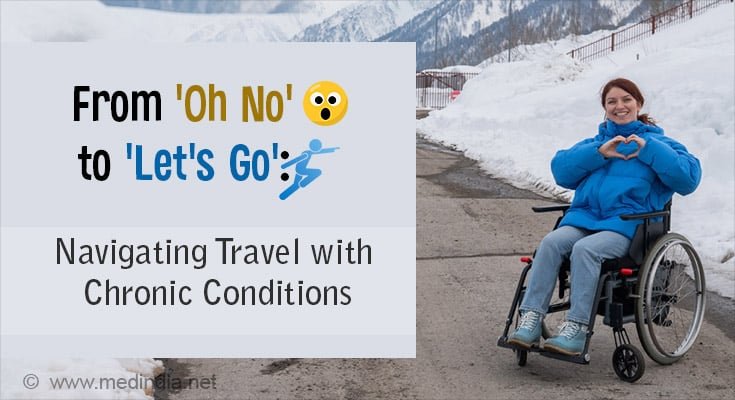Guide to Healthy Journeys With Chronic Health Issues

“As we look forward to the holidays, many people will be traveling to spend treasured time with family and friends, or maybe just to enjoy some relaxation on the beach or ski slopes. For some that just means throwing a few essentials into a backpack and hitting the roads or airways,” said Gladys Velarde, M.D., FAHA, a national volunteer with the American Heart Association and a professor of medicine at the University of Florida in Jacksonville. “It’s not always that simple for people who have chronic health conditions that require multiple medications or special medical equipment. There are also considerations for how to maintain your health and not put yourself at increased risk.”
According to Velarde, having a chronic health issue does not preclude you from traveling. A little planning and preparation can alleviate travel anxiety and prepare you for your next big adventure.
How to Maintain Your Health While Traveling
Consult with your primary care physician:
Discuss your trip plans with your primary care physician or a specialist, as well as any unique health considerations. They can provide personalized advice on any limits or safeguards you should take. Carry a copy of your vital medical records as well as a list of phone numbers for your doctors, including emergency contact information.
Advertisement
Manage your medications:
Ensure your drugs are clearly labeled and that you have enough to last the duration of your vacation. Carry a list of all medications, including dosages and pharmacy information, with you at all times. Work with your healthcare physician to change medication schedules if you’re traveling between time zones. Some prescriptions may require refrigeration, so you’ll need to research how to pack them properly for airport security or other modes of transportation, as well as ensure you will have access to a refrigerator in your hotel or other lodging.
Plan for the transportation of medical devices and supplies:
Whether you’re traveling by airline, bus, train, cruise ship, or another mode of transportation, you’ll want to plan if you have any specific medical equipment. If you use a wheelchair, walker, or other mobility aid, you should check with the company you’ll be traveling with on how to transfer those. This also applies to portable oxygen and CPAP units. If you use a blood pressure or glucose monitor regularly, make sure you bring it with you.
Research the Local Climate and Elevation Before Making Travel Plans
“Depending on where you’re traveling, you will also want to do some research and planning specific to the location,” Velarde said. “The local climate and elevation may impact how you feel – extreme heat or cold can affect circulation and put extra strain on your heart. In high altitudes, there is less oxygen in the air, and that means less oxygen will be carried in your blood. You will want to familiarize yourself with the local emergency numbers and the location of nearby medical facilities and pharmacies in the area where you are visiting.
The American Heart Association features an interactive map that allows you to identify hospitals around the United States that have been recognized for regularly adhering to up-to-date, research-based treatment guidelines for heart and stroke care.
Tips for Safe Air Travel
According to Velarde, plane travel is extremely congested during the holiday season, and planning ahead of time can help.
Walking through crowded airports can be exhausting. Request a wheelchair or courtesy cart to your terminal when booking your ticket.
You may need to go through a particular security check at the airport if you have a pacemaker or an implanted cardioverter-defibrillator (ICD).
Long airline travels, particularly those lasting more than four hours, may raise your risk of blood clots, such as deep vein thrombosis and pulmonary embolism. To help increase your circulation, consider wearing compression socks and getting up and walking around the cabin when it’s safe to do so. With some basic heel and toe lifts, you may also strengthen your calf muscles and stretch your legs while sitting.
Being trapped in an airport due to flight delays can be aggravating, but in many U.S. airports, you can convert that unpleasant experience into a lifesaving one. In some locations, look for specially marked kiosks where you can learn the two simple steps of Hands-Only-CPR via an interactive teaching module.
Emergency Medical Service Protocol
Know the symptoms of a heart attack, stroke, or cardiac arrest, and contact 9-1-1 if you or someone you are with experiences any of them. EMS can frequently begin treatment right away and alert a hospital to the type of emergency care required.
“Maintaining your health while you are traveling is also important. Stay well hydrated, don’t overindulge in food or drink, know your physical activity limits, pace yourself and rest as often as you need,” Velarde said. “Anticipating a big trip can be stressful for many – and stress is not good for your health. Every individual’s condition is unique, and you’ll want to tailor your travel plans to your specific needs. By taking a little time now to plan and prepare, you can enjoy your holiday or vacation can be just what the doctor ordered to help you unwind and recharge.”
Reference :
- Make a list, check it twice with these heart-healthy holiday travel hacks – (https:newsroom.heart.org/news/make-a-list-check-it-twice-with-these-heart-healthy-holiday-travel-hacks?preview=186c)
Source: Medindia
Source link
#Guide #Healthy #Journeys #Chronic #Health #Issues



